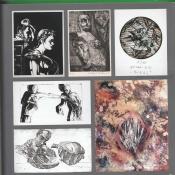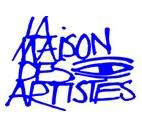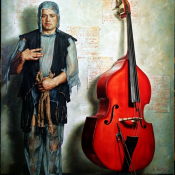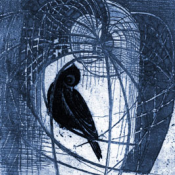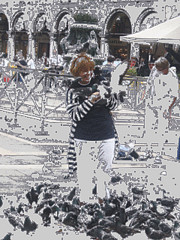Creation Category:
Liana Vrajitoru Andresen

LIANA VRAJITORU graduated with a PhD in English at the State University of New York in Binghamton and now teaches in the English Department at South Texas College, McAllen, Texas. Her translations of Traian T. Cosovei, Aurel Dumitrascu, Mariana Marin, and Elena Stefoi (all with Adam J. Sorkin) have appeared in Poetry New York, Faultline, Pif Magazine, Kalliope, The Kit-Cat Review, Smartish Pace, Runes, and Frigate.
Sound Waves
“And here you have it again, that canary voice I just can’t let you forget. Vera Lynn, with her 1942 recording of ‘The White Cliffs of Dover.’ You’re listening to our goldies hour, with your DJ, Charlie Tainter.”
Nodding to the separating glass, he turned off the microphone and started the song, then pulled his earphones off. The violins’ opening lines gilded the studio’s walls with the intimacy of fresh snow and fire places. Vera Lynn’s wavy voice took over, deepening the mood with the shadow-of-war, soft grayness of the first lines: I’ll never forget/ the people I met/ braving those angry skies—
The DJ closed his eyes, leaning back in his chair.
In the control room, there was no piety.
“He’s just too much into it,” Danny said, holding his long chin. He reached for the sound board, slightly touching the blue tabs to push them higher, then pushed them down to about the same level as before. He grabbed his chin again.
“Stop messing with the pot. The mic is fine,” said Rob. His gruff voice emerged from somewhere inside his big, gray mustache. He beer gut did not quite fit into the chair.
Danny straightened his back, carefully folding his bony hands in his lap.
“You don’t think he’s too obsessive about this 30’s and 40’s music deal?” Danny said. He adjusted his Bottega Velena cashmere hat and planted his blue suede Varvatos shoes up on the turret table, carefully avoiding the phone. He glanced at Rob, who pretended not to notice the boldness of the move.
“Say that to him and see if he gives you a full hour on air.”
“I’m just saying. At least he should lay off the depressive stuff. Go for laughs, the ‘Mad Dogs and Englishmen’ with the cool accents, or those two guys with the Vader voice and the woman’s voice, ‘Jetsam and Flotsam?’ Not the 80’s thrash metal band, the older one.” He sunk more into his legs-up position.
“You don’t get it. Charlie was born to play this music. It’s in his family. Been in his blood since the caveman.”
“Yeah, DJ Caveman, right? Playing I’ve Engraved ‘I Love You’ on This Tiger Tooth.”
Rob shook his head. Over the tremulous voice of the singer, he signaled three fingers to DJ Tainter.
There’ll be blue birds/ over the white cliffs of Dover/ tomorrow, just you wait and see.
“I guess it will still take me awhile to get used to all these signals,” said Danny. He scratched his head lazily through the hat. “How long did it take you?”
“I don’t remember, kid.”
Rob’s eyes moved up above the separating glass. He froze mid-nod. He smoothed his mustache with scratching sounds, then he pointed up.
“What?” said Danny. He turned to look at the frame on the wall—one of the grainy, old-stained photographs in the control room. This one was larger, different from the rest: it had a stern, bearded old man with a hat, while the others showed old family photos and country landscapes. “What are you pointing at?”
“I could’ve sworn the picture moved.” Rob swallowed. His Adam’s apple went up and down twice.
“The STL is too high, sends vibrations into the wall,” Danny said.
“No.” There was something less than reassuring in Rob’s cheeks losing color. “There, it did it again.”
“Just now? You mean it vibra— What the eff, man, what was that?”
“Damn right what the fuck,” said Rob, standing up, and Danny followed.
The shepherd will tend his sheep/ the valley will bloom again, the song reminisced. The picture’s vibration made a small, buzzing sound.
Both men took a step back.
Tomorrow, just you wait and see…
In the studio, the DJ looked at the separating glass. “This is your host, DJ Tainter, painting this enchanted hour with the tints of the past.” A faint light illumined his face, and he tilted his head as if he’d seen something, or thought of something.
Rob sat down.
“Danny, sit down, we’re freaking out Charlie.”
The trumpets of a song filled the room, drowning the sound of the picture’s vibrations. A homey duo began ‘Underneath the Arches.’ The picture was still again, but a few LED lights on the sound board flickered underneath it. The anomaly traveled down.
“Shit, they just fixed that,” said Rob.
The flickering stopped somewhere close to the turret table. As their eyes reached the phone, it rang.
“Ah!” Danny jumped. “Crazy phone. You answer.”
“What’s the big deal?” Rob grumbled. He lifted the receiver. “This is WBGB, Boston’s 90.1 Radio Station. Rob Trevor speaking.” The phone was hissing. “Hello?”
Rob turned to Danny. His eyes looked lost.
“Somebody there?” Danny asked.
“Not really.”
“Well, hang up.”
He hung up. The phone rang again.
We dream our dreams away, bom-bom-bom-bop/underneath the arches, body-bom-bop, said the timeless duo.
“Yes? This is Rob Trevor.”
There were a few beeps. Rob shook his head, and Danny reached and grabbed the receiver.
“Hello?” he said. The beeps became louder. Then, a voice.
“Mister Trevor?”
“No, this is Danny.” He covered the receiver. “It’s a child!” Again, into the phone, “Hello?”
There was a sigh.
“Hello? Are you there?”
“Um… You’re talking?” the child said.
“Yes I’m talking! Who is this?”
“Hello?” The child sounded frightened.
Rob gestured to get the receiver back, glancing up at the picture. The picture was still and quiet now.
“This is 90.1, WBGB Radio,” Rob said. “DJ Tainter’s show. Why are you calling the station?”
“Charles Taa’inter?” said the boy. He couldn’t have been older than ten.
“Yes Charlie Tainter. What do you want with the DJ? He’s on air right now. Where are you, kid?”
No answer.
“Kid? I’m hanging up now.” He did. He looked at Charlie behind the glass and saw him staring back. He turned in his chair, as the phone rang again. Danny picked up.
“Yes, hello?” he said.
“You have to say the radio station first,” said Rob. “Should know that by now.”
Standing, Danny glared at Rob and crossed his skinny legs in vintage Guess jeans, leaning on the metallic table.
“Kid, is that still you? Speak up.”
“I am… I am Charles Taa’inter’s son. Can I talk to my father?”
“What did he say?” Rob leaned in.
“It’s Charlie’s son,” Danny whispered.
Rob looked sharply into the studio.
“What?” Danny whispered again.
“Charlie doesn’t have any children,” he whispered back.
...bom-body-bom… pavement is our pillow/no matter where we stray/underneath the arches…
In the studio, Charlie was pacing.
“What’s up with him?” Danny said to Rob, scratching his hat again. He looked at his shaky hands and stuck them in his back pockets. “Too much darn coffee,” he muttered. Then, into the receiver, “What the heck, kid, who are you? Stop calling.”
“And you stop hecking,” Rob said, taking the phone from him. “Hello? Charlie doesn’t have any children.”
“Hello?” The voice trembled. “Is my father there?”
The DJ was pressing his face against the glass now, palms spread on the sides like a mime’s. His eyes were wide, his mouth shouting without sound. “Is my father there” had just been spoken loudly on the radio, over Jean Sablon’s honey-mellow, plaintive ‘J’attendrai/le jour et la nuit/j’attendrai toujour/ton retour.’
“What did you do, dumbass?” Rob hissed, putting his headphones on and shouting a few reassurances into the small microphone.
“I didn’t do that,” Danny said.
Tainter’s voice finally made it into the control room: “Don’t you ever do that again.” Yet his voice wasn’t angry—just hurried and confused.
Rob and Danny looked at each other. They shook their heads.
The DJ finally sat back down. He was rocking to the sides, looking at the floor. Not in tune with the song. Danny realized he was still holding the receiver. He stared at it for a few seconds and put it to his ear.
“Kid?”
There was a long sigh on the other side. Then the child spoke again:
“He… Can you tell my father I’m in Mister Bell’s lab—laboratory?” He sounded out every syllable, his voice wavy, watery.
“Look, he doesn’t take calls at this hour,” said Danny.
No answer. There was heavy breathing.
“Kid?”
“I am—” the child’s voice broke, as if from crying.
“What is wrong with you, kid? Who in God’s name are you?” He turned to Rob. “He sounds scared,” he said. Then, to the phone, “Hey kid, what’s your name? Can you hear me?”
“Aye. I’m Andrew Charles Taa’inter.”
“No kidding. What’s the problem? You can tell me, come on.”
The boy was quiet.
“It’s ok, nobody’s mad at you, just tell me what’s up.”
“Excuse me?”
“This kid has a screw loose,” Danny whispered to Rob. “What’s wrong, Andrew? And what’s with the funny accent?”
“I think… I think I’ve gotten into a bit of a bad show.”
“A what? I don’t know what you’re saying, kid.”
“It’s my fault. Elsie took me to the laboratory and—”
Danny lifted his shoulders at Rob.
“—Elsie is Mister Bell’s daughter,” the child explained.
“Which Mister Bell?” said Danny. He leaned forward, with his elbows on the console.
“Mister Alec Bell. The photophone laboratory. With the telephony.”
“What are you talking about, kid?”
“He makes telephones,” the child said, desperate to be understood. “He was working on the photophone. I wanted to find a ship—”
“A ship?”
“—To see if I could hear a distress signal and save a sinking ship—I know the code, the Morse. Elsie said Mister Bell saved three ships already with the signal interception. But I spilled a cuppa… hot chocolate on the photophone and it beamed frightfully into the mirror on the magnetic wall, and Elsie said her father’s going to proper kill me.”
“Her father being—?”
“Mister Alexander Bell.”
“As in, Alexander Graham Bell? So this a prank, right kid? Enough of this now, we get it. Don’t call back.”
No answer. The child was crying. On the other side of the glass, an intense orange light had settled over Charlie’s face, Charlie’s desk. The microphone, the walls. Charlie’s features were elongated with some kind of fear, and his mouth was half open. He stood up.
As the door opened and Charlie stormed into the control room, Danny quickly hung up. Charlie looked much taller on this side of the glass.
“Hi Charlie,” Danny said. Rob crossed his arms and looked at the sound board.
“Morons!” Charlie blurted out. “Absolute morons. I’m having you fired.”
“Oh come on, man. Did the kid sound on air again?” said Danny.
“Why aren’t you in control over here? Playing with the fucking lights now? And—”
The phone rang. They all looked at it. Rob extended his arm to pick up, but Charlie was faster.
“DJ Tainter.”
Danny looked at Rob. Rob coughed.
“Aye, can I speak with my father?” the child asked.
Charlie squinted hard at the phone. “Who are you looking for?” He looked at the picture on the wall, looked deep into it as if it would speak back. The big eyes in the picture were sunken in their sockets, just like his.
“Mister Charles Tainter, sir,” said the eager voice on the phone.
Charlie covered his forehead, beads of sweat on his face.
“I’m playing some music here,” he said, his voice a half-whisper. “Who put you up to this?”
The song had ended, and Charlie looked dumbly at the separating glass and blinked repeatedly. He lifted his arm as if to point to the glass with the receiver, then put it to his ear again.
“I have to play a song now,” he said. “Don’t call here again.”
He stumbled to the door and rushed to the microphone, to turn it on. He sat down, wiping off his face with the back of his big hand.
“I’m going to play—” He laughed unconvincingly. “I’ll play three songs in a row for you now, how about that? It’s time for Bunny Berigan.” He pushed the button and stood up.
He did not leave the room.
Left on the table, the phone let out a small, pleading voice. Danny shook his head and took a step back, so Rob finally picked up. The child was sobbing, still trying to explain.
“Mister Alexander Bell—he was tryin’ to send the sound on a beam of light. Elsie heard it once at the magnetic—the mirror wall. It’s the picture of my father. When I spilled the chocolate, the beam hit the picture and I think I did something to it. It was shaking. It keeps shaking. Can I speak with my father, sir?”
Rob’s face darkened, as he bent over the table.
“My father—he’s Mister Alec’s assistant. He worked with him on the photophone—” The voice disappeared for a few seconds. “—more than the telephone, but he doesn’t know if it will ever quite work.”
Rob shook his head and said to Danny, without attempting to whisper, “Now he’s talking about Alexander Bell again. The Alexander Bell?”
“—and a phonograph, and a flying machine, and I want to be an inventor like Mister Bell, but my father—”
“Say what now?” Rob tried again, sounding as if he’d given up.
“—Elsie—”
The voice hissed a few more seconds, then the sound stopped. The phone went silent.
“The kid’s gone,” Rob said matter-of-factly, yet with a hint of disappointment in his monotone.
Greta Garbo has had me to tea/still I’m broken-hearted/‘Cause I can’t get started with you, sang Benny Berigan, but no one cared.
In the studio, DJ Tainter sat slumped in his chair, his back to the microphone.
“What was that about?” Danny said. “Charlie has a secret kid with schizo problems?”
“Maybe,” Rob said.
“You said he has no kids.”
“Hey, will you bring that frame down. I want to take a look at it.”
Danny climbed on the metal table with the phone on it, and stretched his long arms above, grabbing the frame with both hands. With a few tugs, it came off the wall, leaving behind an empty discoloration. He lowered the frame, and Rob grabbed it carefully and set it on the floor.
“Flip it over, Danny.”
“Charlie will be mad.”
“Something’s written on the back,” Rob said, straining his eyes. “That’s Charlie’s writing. What’s it say?”
“Says, Charles Sumner Tainter. Cca 1885. My great-great-grandfather. That’s just messed up. So this guy in the picture is related to Charlie?”
“He got those pictures from a Genealogy Center. He says this one is his favorite, because this man was famous.”
“Why is he famous, because he’s the great-great-grandpa of a DJ?”
“I don’t know, and I’m not gonna ask,” said Rob, frowning to himself.
“Just a sec.” Danny took out his iPhone. He buttoned for a while. “Seriously?” He pushed his hat all the way up to reveal his gelled, ruffled hair. He looked at Rob.
“What? You found something about his grandfather?”
“This is totally weird,” Danny said and turned the iPhone to show Rob.
“I need reading glasses, buddy. Read it.”
“So this is what’s up. According to Wikipedia,” he said and pulled his hat back on his forehead, “Charles Tainter was an American scientific instrument maker, engineer and inventor, best known for his collaborations with Alexander Graham Bell.”
The room was filled with the sounds of 30’s blues, now lugubrious as if played directly from a cemetery. Rob opened his mouth but did not speak. Noiselessly, the door opened, the two still hunched over the picture. They looked up to face Charlie, now towering over them. He bent and snatched the picture, lifting it above their heads.
Rob stood and pulled up his ill-fitting khakis, then smoothed his mustache. Danny walked over to the console and busied himself.
“Charlie,” Rob said, taking a fatherly tone. “You have to tell us, because this is messed up. Do you have a secret son?”
Danny looked up from the console. “Rob, don’t.”
“Shut up, Danny. Look Charlie, I don’t want to interfere with family business and all, but I never knew you had any kids. And I’m sorry, but your kid is really strange. There’s more—”
Charlie’s face had lost all the blood.
“I have no kid!” he said, too fast. “Is it Betty who set this whole thing up? You’re listening to Betty’s bullshit? That kid is not mine—Was she on the phone too?”
The music sounded like deep silence. The notes of a trombone floated around the room pointlessly, with antique sadness.
“Say what?” said Rob.
Charlie looked at him as if they were both drunk.
“Stop this nonsense,” Charlie whispered. “That kid of hers wants to be a DJ. That’s no proof he is mine, you know? I have to go back. The song is ending.”
He left the room. Watching him, they could have sworn he was staggering.
“The heck was that about? Who’s Betty?” said Danny. “Look at this.” He showed his iPhone to Rob.
Rob pushed the iPhone with his hand. “What?”
“Oh. Well it says here, Tainter and Alec Bell worked together on a photophone, to transmit sound on a beam of light into a mirror, and they sent it two hundred feet away. The kid, that’s what the kid was saying.”
“So?” Rob crossed his arms.
“I had this crazy idea that maybe the kid was right, that he was not this Charlie Tainter’s son, our Charlie, but the other one’s, the great-great—”
“Stop it. Don’t you lose your mind too.”
Danny looked at his iPhone, then at Rob. He gave a choked laugh.
“Yes, that would be too effed up.”
“Danny, I’d say lay off the shrooms but I know you’re a clean kid, so go back to the console. And not another word about it to Charlie. Subject’s closed.”
“Aye aye, Captain,” said Danny. “Man, tell him to play Flat Foot Floogee, that hillbilly stuff. He’s putting us to sleep big time.”
“I thought you hipsters were more into garage bands.”
Danny laughed. His face straightened with delayed hurt. Then he mock-punched Rob in the shoulder.
Rob grinned and nodded, his walrus mustache bobbing to the gentle rhythm of the song.
***
Danny had not read the entirety of the Wikipedia entry about Charlie Tainter. In 1885, said the part he hadn’t finished reading, his young son was caught playing in William Graham Bell’s photophone laboratory and notoriously took a beating from his father, which he would later write about in his memoirs.
According to a footnote, a child named Andrew dreamed of saving drowning people from frozen seas. He took a beating for it. Years later, he would fall in love with the radio.

